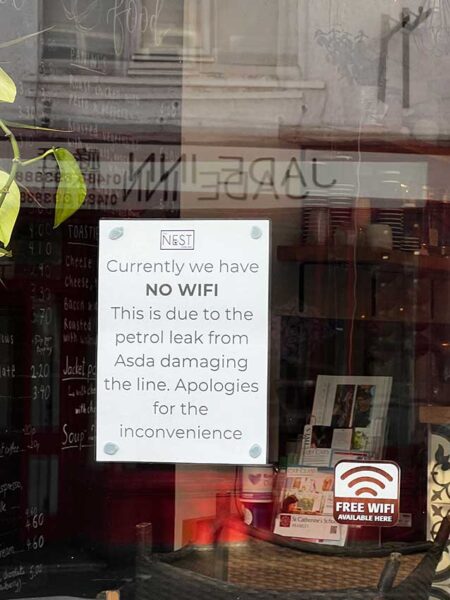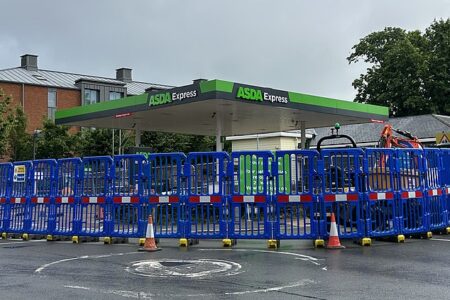The picturesque village of Bramley in Surrey has become a sad example of a modern disease afflicting Britain: the disappearance of accountability.
A mysterious foul odor that started in a pub basement has escalated into a full-blown environmental and bureaucratic disaster, with petrol seeping into the ground and the local authorities not caring. A petrol station formerly owned by Co-op and now run by Asda has been leaking fuel for years, causing significant damage to the environment, residents and their livelihoods. But the most disturbing part of this saga is that no one wants to take responsibility.
To outsiders, Bramley’s story of plight reads like a Kafkaesque nightmare. A broken pipe under an Asda forecourt leaked fuel into the village’s water system, contaminating supplies, killing fish and forcing authorities to replace pipes. Since May, 600 households have been unable to drink tap water safely. Thames Water is doing its best, but residents have been left scarred by ongoing roadworks and disruption to businesses, while their homes now face the risk of toxic petrol slicks. Their concerns about property values appear to be falling on deaf ears.
Asda, the current owner of the petrol station, has deftly distanced itself from the problem, describing it as “historic”. The supermarket chain is now owned by private equity giant TDR Capital, a fact that adds to the sense of needless corporate neglect. Meanwhile, Surrey County Council has handed responsibility to Waverley Town Council, which claims no power to intervene. The Environment Agency, citing an ongoing investigation, remains silent, while the UK’s Health Security Agency insists its role is “advisory, not regulatory”.
Asda boss Lord Rose, who was revealed this week to be taking over from Mohsen Issa, told a meeting of residents in the village that there would be “no quick fix”.
For the people of Bramley, this array of agencies, councils and businesses is theoretically there to protect them. Yet as their small village descends into crisis, each body points the finger at the other, leaving villagers facing an uncomfortable truth: when something goes wrong, no one is prepared to take responsibility. It’s not just a local problem, it’s emblematic of a wider issue across Britain today.
This shift away from accountability is something Dan Davis explores in his book Machine of UnaccountabilityThis model of “system” paints a grim picture of how large systems are structured to avoid responsibility. The Kafkaesque dance of blame-shifting at Bramley is a perfect example of what Davies calls the “accountability pool” – a place where decision-making is so fragmented that no one is ever to blame when things go wrong. Bramley has become an unwitting symbol of this modern malady, in which sprawling bureaucracies and corporations have lost the capacity, or perhaps the will, to respond to human problems with anything other than indifference.
Bramley’s story is not just a freak occurrence; it is the result of a long-standing trend toward unaccountability. It’s a mindset that began in the early days of corporate structures, when limited liability allowed investors to reap the rewards of risk without bearing the full consequences of failure. This made sense, Davies explains, when risk was spread among individual shareholders, such as a widow investing her savings in a railroad company. In today’s world, however, private equity giants and multinational corporations benefit from this protection—shielded from blame when things go wrong.
But what happens when the system becomes so unmanageable that the feedback loop between action and outcome breaks down entirely? For the people of Bramley, this means they are left in a maze of agencies and authorities, none of which seem to have any real interest in fixing the problem. Companies like Asda, backed by private equity firms, are happy to claim that the problem predates their ownership, leaving the villagers feeling frustrated and abandoned. It’s a game of passing the parcel with no winners, only losers.

Systems designed to manage the complexities of the modern world often sever the direct link between decision-making and accountability, Davies points out. As organizations grow larger and processes become more industrialized, their workers lose their sense of agency. It’s not that no one cares—it’s that they operate within a framework designed to prevent anyone from caring. Davies likens this to a “cat without a brain”—a system that is technically capable of functioning but that lacks the ability to respond meaningfully to real-world issues.
For the people of Bramley, this cold, emotionless system is all too real. They face the frustration of talking to lower-level officials who simply lack the power or authority to take decisive action. And in many ways, the problem goes beyond the details of the gasoline spill: it speaks to a much larger crisis in our institutions and companies, where the pursuit of efficiency and profit has rendered human problems invisible.
What is particularly damning is the realization that this could have been avoided if someone, somewhere, had cared enough to act sooner. In a simpler time, the leak might have been fixed, apologies made, and compensation offered. But now, determining who owns the problem seems impossible. Residents are left in a vacuum, with businesses, local governments, and national agencies pretending that it is someone else’s business to solve.
The truth is that the system is designed to fail them. The rise of private equity, the fragmentation of regulatory responsibility, and the erosion of local authority power are all contributing to a culture where responsibility is easily evaded. Unless something changes, Bramley’s experience will not be unique. Other villages, towns and cities across the country may find themselves caught in similar webs of indifference and inaction.
Bramley’s ordeal is a warning. It shows us what happens when we allow accountability to slip through the cracks, when systems are designed to protect organizations rather than the people they serve. If we don’t begin to address these accountability gaps, the question is not if another village will suffer, but when.
